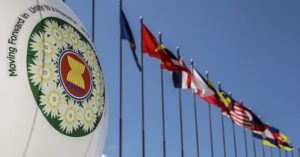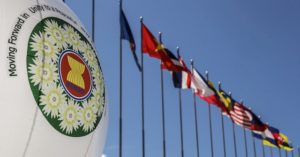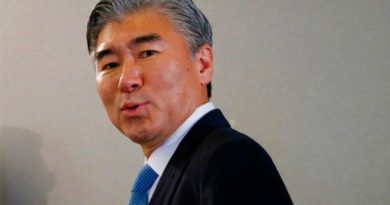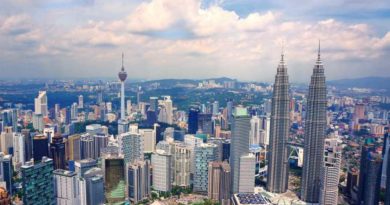COLUMNIST-OPINION: Asean must unite to resolve Covid-19


Having gone through the thick and thin of international affairs for more than 52 years, Asean’s resilience is self-evident. Its first two decades were beset by ideological divisions between Indochina and the rest, but since then Asean has managed to make itself the centre of a broader Asian regionalism, playing an architectural role to promote regional peace and stability by setting up a host of cooperative vehicles and mechanisms — from the Asia-Pacific Economic Cooperation in 1989 to the East Asia Summit and Asean Defence Ministers’ Meeting Plus more recently.
But Asean has never faced anything like Covid-19. This is a fast-spreading public health crisis in a region with weak healthcare systems. Case numbers in Southeast Asia so far appear suspect with a lot of downside risks.
 Ads by: Memento Maxima Digital Marketing
Ads by: Memento Maxima Digital Marketing
@ [email protected]
– SPACE RESERVE FOR YOUR ADVERTISEMENT
Thailand’s infections have surged past 1,000, while Malaysia’s is approaching 1,800. A country of 270 million, Indonesia has reported fewer than 800 infections thus far. The Philippines, with its population of 110 million, also have reported well below 1,000, and only a handful of cases were reported in Cambodia, Laos and Myanmar. Mortality rates have remained under international benchmarks of 3-4%, based on established numbers of infections.
What is troubling for Asean is that these numbers likely stem from under-reporting, and will probably rise alarmingly in the weeks ahead. To Asean, as a region of 660 million with an aspiring economic community, the coronavirus is an existential danger. Based on known facts, figures and trends, it is not farfetched to estimate that many millions of people across Asean will come down with the disease. Too many could perish in the process, as healthcare systems in less developed Asean countries, such as Cambodia, Laos and Myanmar, become overwhelmed. For Thailand, these three mainland Southeast Asian countries are particularly crucial, because the Thai economy relies on their migrant labourers.
 Ads by: Memento Maxima Digital Marketing
Ads by: Memento Maxima Digital Marketing
@ [email protected]
– SPACE RESERVE FOR YOUR ADVERTISEMENT
Asean has banked itself on its development potential and its geostrategic location straddling Northeast Asia, South Asia, and the Asia-Pacific, and Europe. It is the fastest-growing region in the world, with a growth trajectory of more than 5%. Its internal market comprises relatively young demographics and rising middle classes with increasing purchasing power. Although domestic politics are contentious in almost all Asean countries, the region is devoid of cross-border conflict.
What Asean aspires to be can come to naught if the Covid-19 pandemic is not contained. The disease is making its rounds in waves through countries, with potential reruns. The public health crisis is just the beginning, as its impact will spill over into the socio-economic realm — from social re-adjustments due to increased mental and physical isolation to economic recessions and possibly an outright depression, depending on how wide and deep the pandemic runs and how governments responses around the world respond to it.
Compared to the devastating 1997-98 economic crisis in Southeast Asia, Covid-19 may actually be much worse. Back in the late 1990s, Southeast Asian economies, especially Thailand and Indonesia, could find a lender of last resort in the International Monetary Fund and turn to external demand for economic recovery. This time, the global market will not be ready and demand won’t be enough to prop up Asean’s growth and recovery.
 Ads by: Memento Maxima Digital Marketing
Ads by: Memento Maxima Digital Marketing
@ [email protected]
– SPACE RESERVE FOR YOUR ADVERTISEMENT
At minimum, what Asean needs is transparency and coordination. Asean member states must come clean about their number of cases and roll out wider testing. Some Asean countries, such as Malaysia, the Philippines and Thailand, have imposed virtual lockdowns to slow the coronavirus’ spread, but this should be considered for the entire region for a limited period. If not, Asean’s pronouncements on health sector cooperation as part of the Asean Vision 2025 will be rendered moot.
Singapore has led the way by biting the bullet early on and imposing travel restrictions and social distancing measures. In fact, its vigilant handling of the Covid-19 outbreak is being used as an example for other countries. Thailand and Malaysia, behind the curve until recently, are following suit. Vietnam, as Asean chair, also has tried to stay on top of the outbreak, having come up with and exported affordable Covid-19 test kits.
Once Asean’s more medically-equipped members manage to contain their outbreaks, they should start helping their other Asean neighbours, as the disparity and inequality between Asean’s members are well-known. Covid can do a lot of damage across Southeast Asia, but unless Asean responds as a region, the pneumonia-like disease will keep circulating among its 10 members for much longer.
 Ads by: Memento Maxima Digital Marketing
Ads by: Memento Maxima Digital Marketing
@ [email protected]
– SPACE RESERVE FOR YOUR ADVERTISEMENT
While Asean has to treat Covid-19 as a regional challenge, the 10-member grouping also has to avoid being further divided by the geopolitics of the coronavirus. China appears to have seen the worst of the outbreak and is now extending assistance to other afflicted countries. To reciprocate Cambodian Prime Minister Hun Sen’s demonstration of friendship in early February, Beijing sent loads of medical supplies to Cambodia — similar moves in the future may end up dividing Asean members.
Asean thus must come to grips with three layers of challenges. First, each Asean member has to be strict about exposing and addressing Covid-19 cases within their borders. Then, the whole of Asean must respond to Covid-19 as a united region, through information sharing and effective policy coordination to prevent the disease from returning. And last but not least, Asean must find ways not to let external players use the outbreak to further divide Asean. Indeed, unless it is dealt with squarely and firmly, Covid-19 has the capacity to undo all of Asean’s achievements.
 Ads by: Memento Maxima Digital Marketing
Ads by: Memento Maxima Digital Marketing
@ [email protected]
– SPACE RESERVE FOR YOUR ADVERTISEMENT
THITINAN PONGSUDHIRAK
AN ASSOCIATE PROFESSOR AT CHULALONGKORN UNIVERSITY
An associate professor and director of the Institute of Security and International Studies at Chulalongkorn University’s Faculty of Political Science, with more than 25 years of university service. He earned his MA from The Johns Hopkins School of Advanced International Studies and PhD from the London School of Economics where he was awarded the UK’s top dissertation prize in 2002.
.









